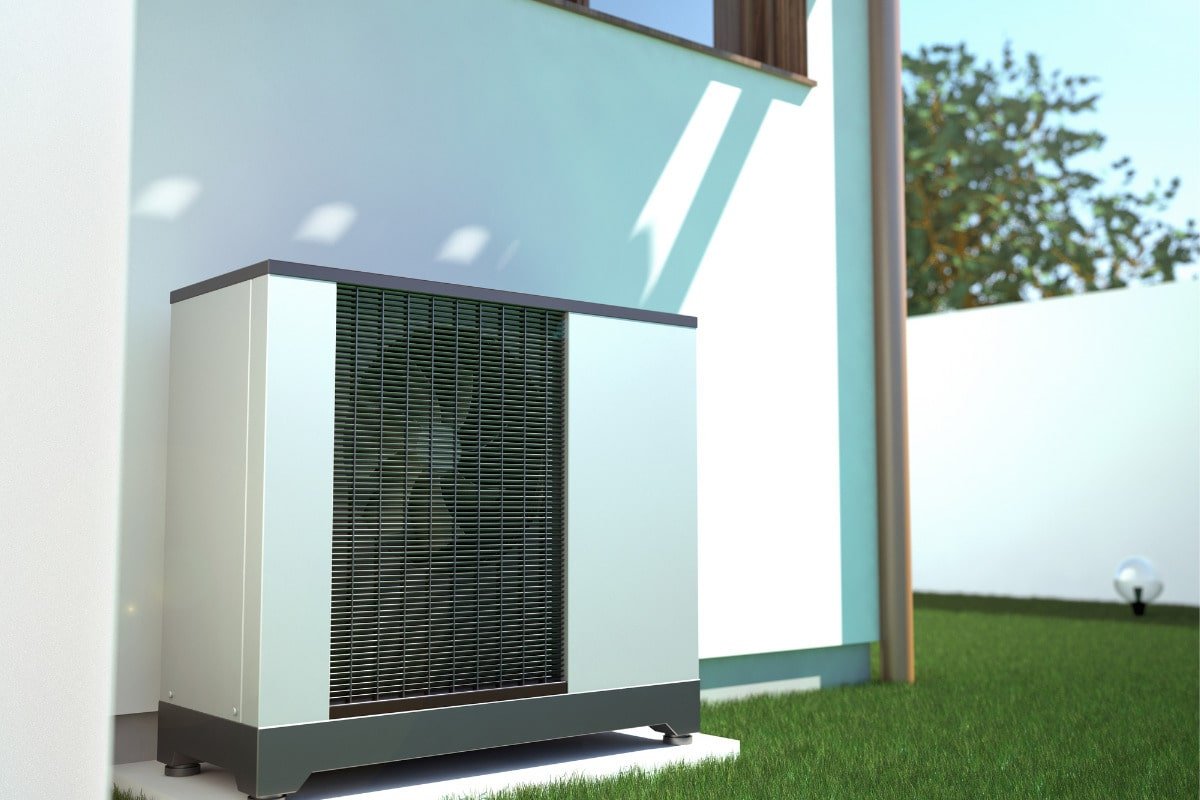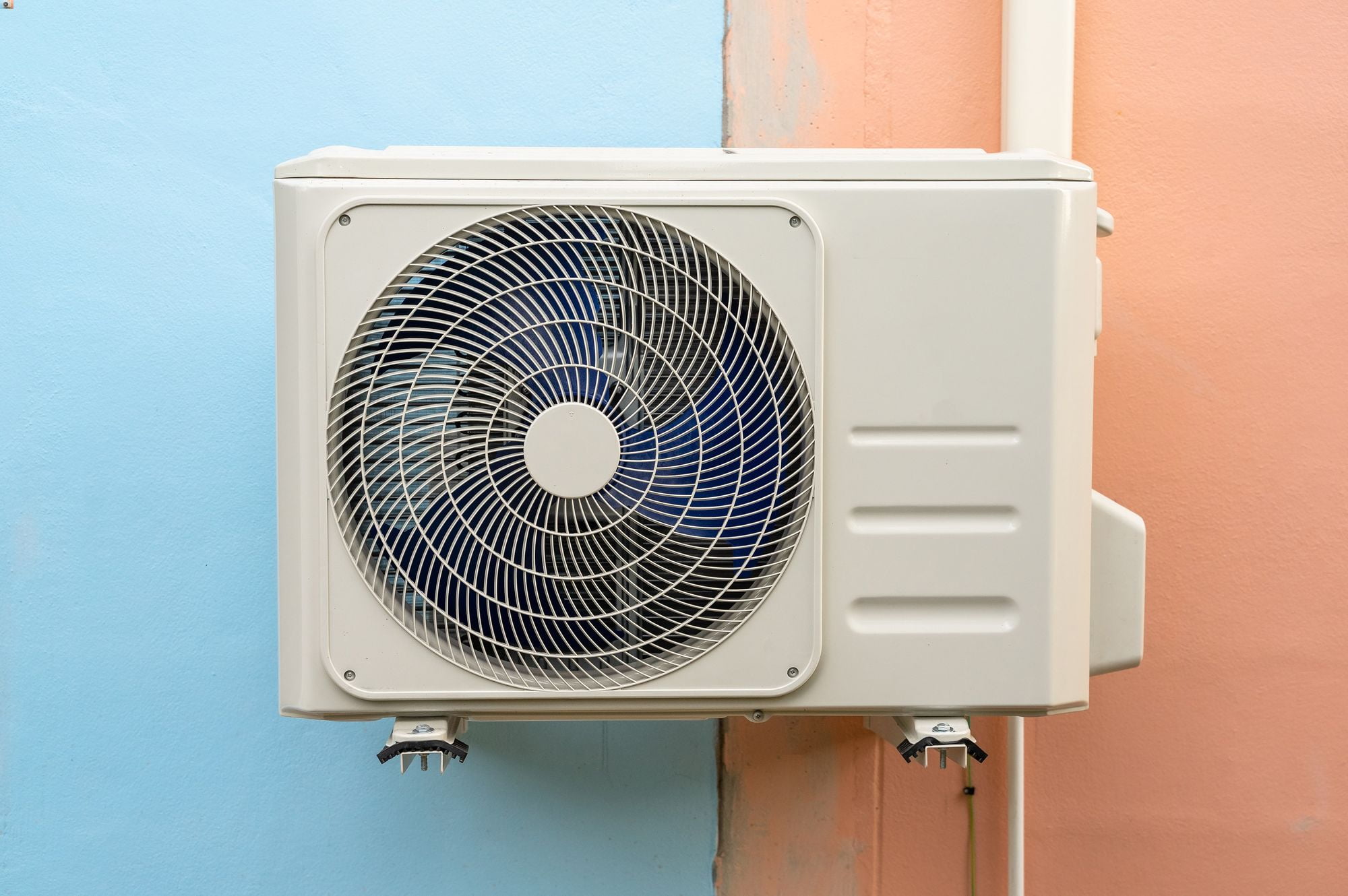
A heat pump collects heat from the outdoor environment and transfers it into your home. Although it requires electricity to operate, the amount of heat energy delivered to your home surpasses the electrical energy used to power the system.
With the growing addition of renewable sources to the electricity grid and the replacement of gas and coal power stations, electricity is increasingly low carbon. As a result, a heat pump is an exceptionally low carbon heating option that will continue to become even more sustainable as our electricity grid becomes more decarbonized.
In the UK, tens of thousands of heat pumps have already been installed, and in Europe, over 1.5 million heat pumps were installed in 2020 alone. To meet the net-zero targets, the UK government anticipates that millions of heat pumps will need to be installed in homes within the next 10-15 years.

What’s on this page?
How Does a Heat Pump Work?
The operation of heat pump involves the use of a compressor and a circulating refrigerant that extracts heat from external sources, such as the heat in the soil or outdoor air, and transfers it to your home.
This process involves moving or pumping heat from one location to another. Compared to electric boilers, heat pumps use significantly less electricity and can achieve an efficiency rate of 300-400%, as they generate more heat energy than the energy they consume.
According to the International Energy Agency's latest special report, achieving Net Zero targets by 2050 requires the discontinuation of the sale of new gas boilers after 2025. As a result, the role of heat pumps in reducing the UK's carbon emissions at both a domestic and national level has significantly increased. The report predicts that by 2050, there will be approximately 19 million heat pump installations in new homes.
The European Heat Pump Association's estimates indicate that the UK witnessed 43,000 heat pump sales in 2021, marking an upsurge of roughly 6,100 units compared to the previous year. Projections suggest that installations will continue to rise in 2023. The government has put forth the heat and buildings strategy, along with a 0% VAT on energy-efficient measures, with the objective of boosting annual heat pump installations to 600,000 by 2028.
Get Free Heat Pump Quotes
Compare the price now by filling in this form - It takes less than 60 seconds
How much does it cost?
Heat pumps can be quite expensive, especially when factoring in installation costs. However, the total cost will depend on the type of heat pump you choose. Generally, the cost for a complete installation can range from £5,000 to £45,000, and running costs should also be taken into account.
Air to water heat pumps typically have a price range of £5,000 to £18,000, while ground source heat pumps tend to be more expensive, ranging from £13,000 to £35,000, with some models costing up to £45,000. The running costs of a heat pump will depend on factors such as your household size and insulation properties. The Boiler Upgrade Scheme grant can cut this figure by £5,000.
Ground source heat pumps generally have lower running costs compared to both air source heat pumps and traditional boilers. This is due to the higher efficiency of ground source heat pumps, with a Coefficient of Performance (CoP) ranging from 3.5 to 4.5. In contrast, the CoP of air source heat pumps typically ranges from 2.5 to 3.5. (A higher CoP indicates a more efficient system.)
As previously mentioned, the efficiency ratings of both heat pump types are significantly higher than those of boilers. This means that you could save a considerable amount on your energy bills. For example, if you switch from electric heating to a heat pump, you could potentially save up to £1,200 annually.
The below table shows the estimated cost of different types of heat pumps:
| Air Source | Ground Source | Water Source |
|---|---|---|
| £5,000 - £18,000 | £13,000 - £35,000 | £10,000 |
Is it worth installing heat pumps?
Investing in heat pumps offers clear advantages in the long run. The mechanism behind the heat pump simply moves the heat from one space to another, rather than producing it, resulting in savings on energy bills. Moreover, financial support from the government makes heat pumps an even more attractive option. The upcoming heat and buildings strategy is expected to further increase the installation of various heat pumps as a low carbon heating solution.
Depending on your current situation, the repayment time can be significantly shorter than the lifespan of the system, making it a worthy investment. Combining solar applications with heat pumps can also help you achieve zero net energy.
However, it's essential not to overpay on upfront costs. We can help you ensure that you're getting the best possible deal on your heat pump installation, saving you time and effort in finding reliable installers. By clicking the button below, you can receive up to three free quotes from qualified installers in your area. You're under no obligation to accept any of the offers, so you can make a commitment only when you're ready.
Get Free Quotes
Compare the price now by filling in this form - It takes less than 60 seconds

Pros and Cons of Heat Pump
-
Lower Running Costs
-
Minimal Maintenance
-
Enhanced Safety
-
Low Carbon Footprint
-
Cooling Capability
-
Long Lifespan
-
Eligible for Boiler Upgrade Scheme
-
High upfront cost
-
Environmental Concerns
-
Installation Process
-
Cold Weather Issue
Get Free Quotes
Compare the price now by filling in this form - It takes less than 60 seconds
Different Types of Heat Pumps
There are several types of heat pumps that are available, and the selection of the ideal one for your home depends on two factors.
The first factor is whether you prefer to extract heat from the soil, ambient air, or a nearby water body. While digging up your garden and laying pipes beneath is required for soil heat extraction, minimal space and a fan that continually produces a low level of noise are required for ambient air heat extraction. A water source heat pump, on the other hand, can be employed if you have a water body close to your property.
The second factor to consider is whether you want the heat to be used for conventional heating, such as domestic hot water and radiators or underfloor heating, or for heating the house through ventilating with heated air, similar to an air conditioner cooling a room.
Heat pumps that use the soil as their heat source are known as ground source heat pumps, while those that use the ambient air or water are known as air source and water source heat pumps, respectively. These general terms may be further subdivided based on their specific applications. Other variables, such as the heat pump supplier, the size of your garden, and your budget, can also influence which system is most suitable for your needs, whether it is an air source, ground source, or water source heat pump.
Ground source
Air Source
Water Source
Ground source heat pumps are typically used to heat water, and though it is possible to use them in conjunction with additional components for heated air ventilation, they are more commonly used for traditional radiators and underfloor heating.
Both air source and water source heat pumps can be used to heat water and indoor air in your home. Air-to-water and water-to-water heat pumps are the terms used to describe these heat pumps when used for water heating, while liquid-to-air heat pumps are a specialised type of water source, air-heating system.
Typically, air-to-air heat pumps offer hot air ventilation and can be reversed without requiring any additional equipment to cool your home.
If you are interested in having a heat pump installed, it is recommended that you consult a professional heating engineer. They will evaluate your specific requirements and provide you with a quote for their services, assisting you in finding the heat pump system that is best suited for your home.
Get Free Quotes
Compare the price now by filling in this form - It takes less than 60 seconds
Is a Heat Pump right solution for you?
Government Incentive Schemes
To support the installation of sustainable heating systems, the UK government offers various heat pump grants. One of the most well-known is the Boiler Upgrade Scheme, which was introduced in April 2022 and provides the following benefits:
A £5,000 discount on the supply and installation of an air source heat pump.
A £6,000 discount on the supply and installation of a ground source heat pump.
A £5,000 discount on the supply and installation of a biomass boiler.
This grant is available to homeowners in England and Wales. Scotland also has specific grants, such as the Home Energy Scotland Loan and the Warmer Homes Fund. In addition, residents of Wales can benefit from the Arbed am Byth Scheme (Warm Homes Scheme).
The Boiler Upgrade Scheme was introduced following a 2021 report from the International Energy Agency, which recommended that no new gas boilers should be sold after 2025 to achieve Net Zero targets by 2050. The government has announced a phase-out of new gas boiler installations by 2035, making heat pumps a likely mainstay in home heating in the UK as a highly efficient, low-carbon alternative.
Warranty Periods
The warranty periods for heat pump systems are typically 2 to 3 years, although extended warranties are available for purchase. The workmanship of the system is usually covered by a 10-year warranty, while Quality Assured National Warranties offer additional types of protection. Additionally, manufacturers and installers may offer various types of supplementary warranties.
Maintenance
Proper maintenance can significantly increase the lifespan of a heat pump, which typically lasts for around 15 years or more and can even extend up to 50 years. It is recommended to have yearly checks and a professional inspection every 3 to 5 years. During winter, manual defrosting may be necessary.
After the inspection, the installer should provide a written report on the system's condition and any indications of potential future issues.
The Ground Source Heat Pump Association notes that maintenance requirements are generally low, as crucial safety checks are unnecessary. Standard components to inspect before starting the system include the pump, external pipes, electronics, and fittings.
Find the Best Heat Pump Supplier
Heat pumps, no matter ground source, air source, and water source, offer a great way to upgrade your home. Not only can they provide a solid return on investment, but they can also enhance the quality and value of your property.
However, finding accurate and fair installation quotes can be a tough task. National companies may overcharge you for supply and installation. Instead, Eco Energy Expert can make things easier by connecting you directly with up to 3 licensed installers.
Simply answer a few brief questions to obtain your free quotes (It takes less than 1 minute).
Get Free Heat Pump Quotes
Compare the price now by filling in this form - It takes less than 60 seconds











